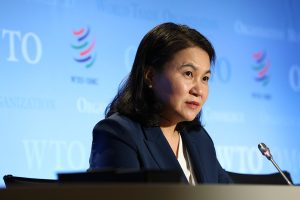South Koreans are holding out hope that their nomination to be director general of the World Trade Organization, Yoo Myung-hee, will still be able to clinch the role despite a consensus building around her competitor. But with the United States backing Yoo at the final hour this week, the race to choose the organization’s next leader is far from over.
Earlier this month, Yoo was chosen as one of two finalists for the WTO’s top position along with Nigeria’s Ngozi Okonjo-Iweala. With both of the finalists being women, the organization is poised to have its first female leader in its 25-year history. This summer, Director-General Roberto Azevedo stepped down from the post a year early, sparking a race among member states to put forward a contender for the trade organization’s top spot.
Until recently, Okonjo-Iweala had been a near shoo-in, after garnering public support from many member states and, most recently, the European Union.
After indirectly signalling its support for Yoo, including by directing U.S. embassies around the world to discuss her nomination with their local counterparts, the U.S. Trade Representative on Wednesday officially announced their choice: “Minister Yoo is a bona fide trade expert who has distinguished herself during a 25-year career… This is a very difficult time for the WTO and international trade… The WTO is badly in need of major reform. It must be led by someone with real, hands-on experience in the field.”
Whoever ends up in the position will have the difficult task of trying to tackle much-needed reforms, revive trade talks that have been stalled for decades, and balance between U.S. and Chinese interests. In fact, this competition with China for influence over the direction of the WTO is part of the director general selection process itself — experts say part of the U.S. motive for backing Yoo is to nudge the organization closer to American interests by picking the candidate from a close U.S. ally.
Yoo, for her part, has tried to distance herself from the political expectations throughout her candidacy, telling the South China Morning Post in an interview in September that she has worked closely with both the United States and China, and expects the decision to be based on experience, rather than on geopolitics.
In practice, it is unclear how much the director general on her own will be able to solve these long-standing issues. In fact, the organization’s protracted gridlock represents both the pressing need for reform and the difficulty its new director (whoever that may be) will face in making those reforms a reality.
But that hasn’t stopped South Korea from throwing its diplomatic weight behind Yoo’s candidacy. President Moon Jae-in has been furiously trying to drum up support, with local media reporting that he’s made multiple calls a day to other world leaders urging them to back Yoo. Foreign Minister Kang Kyung-wha has also joined the campaign, calling her counterparts around the world, including Secretary of State Mike Pompeo, to ask for support.
This is not South Korea’s first attempt at getting a Korean in the director general position — they have put forward two candidates in the past, starting with former Minister for Commerce and Industry Kim Chul-soo in 1994 and then Minister for Foreign Affairs and Trade Park Tae-ho in 2012.
South Korea’s economic dependence on exports, coupled with some high-profile WTO wins for Seoul in recent years, have raised the public attention on the organization. For their part, previous cases plus ongoing tensions over a South Korean Supreme Court case on wartime labor and subsequent trade disputes have Japan concerned about Yoo’s candidacy, and Tokyo has indicated they will back Okonjo-Iweala.
Securing Yoo’s nomination for the director general position could be a big win for the Moon administration, and a point of pride for the public in South Korea. If she loses out on the spot, however, some worry it could be a political loss for Moon after his administration’s highly public campaign to support her candidacy.
The WTO intended to vote and secure a new leader at an upcoming meeting on November 9, but the United States’ new public backing of Yoo may complicate the process — the organization’s consensus-based policies mean that any member could block the appointment of a director general they disapprove of.

































